#Slave Rebellion
Explore tagged Tumblr posts
Text
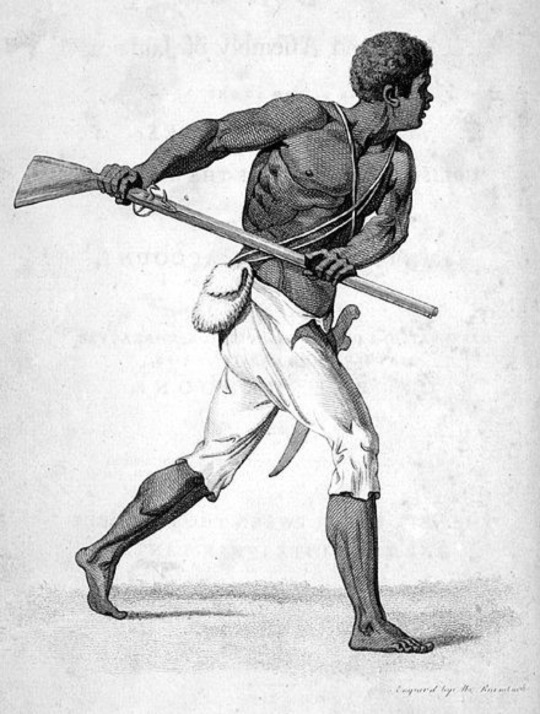
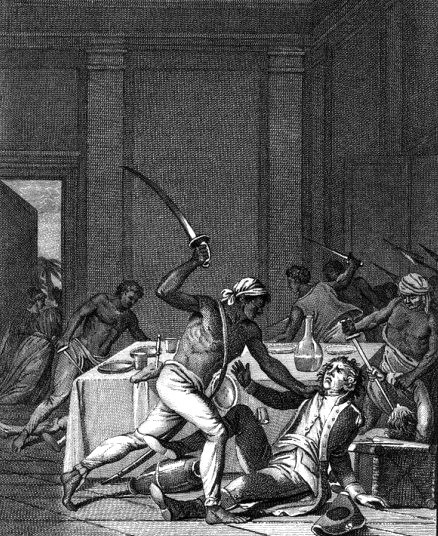
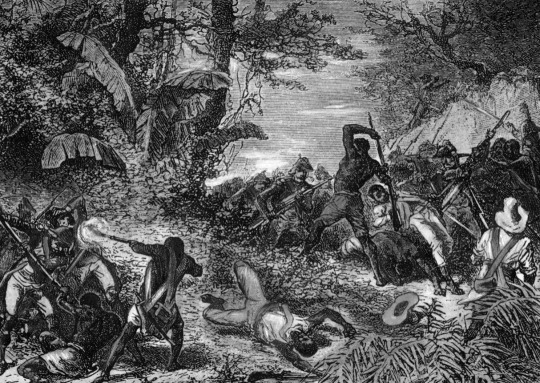
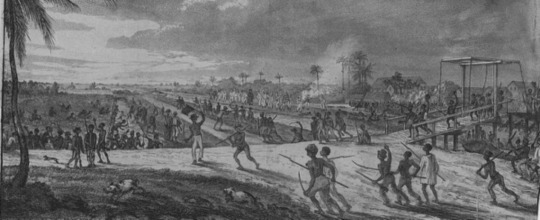
List of notable slave revolts in the Caribbean during the Transatlantic/European Slave Trade. These Slave revolts emphasise the collective struggle for liberation,
unity, and self-determination:
1. The 1638 St. Kitts Slave Revolt: Enslaved Africans resisted early attempts by European colonizers to dominate the island. This uprising showed that from the very beginning, Africans refused to accept their dehumanization and fought to retain their dignity.
2. Barbados Revolt of 1649: Africans in Barbados challenged the plantation system, laying the foundation for future resistance. This revolt demonstrated the shared struggle of African people across different colonies.
3. The 1675 Curaçao Revolt: Enslaved Africans, many of whom were from the Akan and other warrior societies in West Africa, plotted to overthrow the Dutch colonists. This revolt highlighted the persistence of African resistance traditions, even in exile.
4. Tacky’s War (1760, Jamaica) :Led by Akan warriors like Tacky, this revolt was deeply rooted in African military traditions. It was a call for liberation and unity, showcasing the resilience of African cultures under enslavement.
5. Berbice Slave Rebellion (1763, Guyana): Under Cuffy (Kofi), enslaved Africans controlled parts of Berbice for over a year. This Pan-African hero envisioned an independent African-led society in the Americas, directly challenging European colonialism.
6. Coromantee Wars (1765–1766, Jamaica): Enslaved Akan Africans led revolts against British plantation owners. The unity of African warriors in organizing these rebellions demonstrated the spirit of Pan-Africanism.
7. 1773 Grenada Revolt: Africans resisted their French and British oppressors, reflecting a Pan-African vision of collective liberation and defiance against European exploitation.
8. The First Maroon War (1728–1740, Jamaica): Maroons, descendants of escaped Africans, fought the British for autonomy. Their victory in establishing independent territories was a significant Pan-African triumph.
9. Haitian Revolution (1791–1804, Saint-Domingue): The most powerful expression of Pan-Africanism in the Caribbean, this revolution united enslaved Africans and free people of color. Leaders like Toussaint Louverture, Jean-Jacques Dessalines, and others overthrew French rule, ending slavery and creating the first Black republic.
10. Bussa’s Rebellion (1816, Barbados): Bussa, inspired by the African tradition of communal resistance, led this uprising against British slavery. It echoed Garveyite ideals of self-determination before their time.
11. Demerara Rebellion (1823, Guyana): Led by Jack Gladstone and Quamina, this revolt sought freedom for Africans in British Guiana. It reflected a broader Pan-African consciousness and the demand for dignity and justice.
12. Baptist War (1831–1832, Jamaica): Also known as the Christmas Rebellion, it was led by Samuel Sharpe, who united enslaved people under the banner of Christian and African liberation. This revolt hastened the abolition of slavery in the British Empire.
13. The Second Maroon War (1795–1796, Jamaica): Maroons resisted British incursions into their autonomy, preserving their African-rooted systems of governance and solidarity.
14. 1837 St. Lucia Revolt: Enslaved Africans rose up against British oppression. Their resistance embodied Pan-African ideals, rejecting the colonial domination of their homeland.
15. Trinidad Slave Revolt (1838): Enslaved Africans on the brink of emancipation staged a revolt, demonstrating their refusal to accept anything less than complete freedom.
16. 1733 St. John Slave Revolt (Virgin Islands): Enslaved Africans, many of whom were Akan, took control of the Danish colony for several months. Their strategic unity reflected a Pan-African ethos.
17. Leeward Maroon Wars (1730s–1740s, Antigua and Jamaica): These wars involved guerrilla tactics by escaped Africans who maintained cultural and spiritual links to their homelands.
18. Martinique Revolt (1833): Enslaved Africans rose up against French rule, signalling the unity of Black people against colonial oppressors across linguistic and cultural divides.
19. Santo Domingo Resistance (1795, Dominican Republic): Inspired by the Haitian Revolution, enslaved Africans rebelled, resisting both Spanish and French colonial systems.
#black people#black#black history#black tumblr#blacktumblr#pan africanism#black conscious#africa#black power#black empowering#slave revolts#Slave Rebellion#trans atlantic slave trade#african history#black culture#african culture#black community#caribbean history#afro caribbean culture#black liberation#black freedom#uprising#black revolution
254 notes
·
View notes
Text

On this day in … 1816, an uprising of black and enslaved people on the island of Barbados broke out on Easter Sunday night. It was the largest ever on the island and was named for its leader, Bussa, who is today a national hero of Barbados. It started with the burning of sugarcane crop, and soon over 400 participants from 70 plantations had joined up. It was put down by British colonial authorities. Along with two whites,120 black slaves were killed during the revolt, 144 were executed afterwards, and 132 were deported.
Digital illustration hand drawn by @pyrotoons
#drawings#digitalart#portrait#drawing#equailty#history#this day in history#on this day#art#digital art#draw#draws#portrait drawing#Bussa#bussa’s rebellion#slave rebellion#anti-slavery#slavery#British colony#sketches#sketching#sketch#sketchbook#digital illustration#digital drawing#black history#african diaspora#african history
33 notes
·
View notes
Text

The Death of Spartacus by Hermann Vogel
#spartacus#art#hermann vogel#ancient rome#slave revolt#slave rebellion#history#antiquity#thracian#gladiator#gladiators#roman republic#roman#romans#rebellion#revolt#uprising#europe#european#servile wars#third servile war#italy
183 notes
·
View notes
Text
Magneto's revolutionary war

Part 2/2 here.
An 'unstable' Wanda has rewritten the world to give people their heart's desire - turns out Magneto's is to rule a mutant-dominant Earth. The problem is that humans have mutants under the jackboot. As much as there's a historical point of divergence equivalent with the prime reality - it's Bolivar Trask replacing Spiro Agnew as Richard Nixon's VP. He squashed Watergate, overturned the 22nd amendment, and together they've been putting mutants in camps and worse.
Mags engages beast mode and starts wrecking sentinels and liberating mutants. Apocalypse joins him as a fair weather ally with his own insane agenda of total war and genocide.

When Mags puts his foot down on literally killing everyone Apocalypse calls him a pussy, publicly using populist rhetoric to undermine him. Big blue pushes it too far so Mags challenges him, goading him into usurpation. He fucks him up by frying his brain but spares him - making him his official 2iC IF he defers to Mags. More importantly he shows mercy and strength, cementing himself as leader. It's Peeper! My dude spots an incoming sentinel fleet.

Mags does his favourite thing - hurling vehicles around, including smashing sentinels together and tearing them apart. The soldiers and assassins get it too, though he elects to not commit a war crimes by sparing journalists. He takes advantage of their presence to issue a formal declaration of war citing governments collaborating on wiping out mutants as his casus belli.

It's also a promise of liberation heard around the world. Wanda and Pietro hear it, Lorna too, not to mention the most naive man in the world - Charles Xavier. Everyone hears it and most brush it aside at first. So far Mags has been using hit and run tactics to free mutants. It's effective but it's slow and the enemy can win a war by attrition. He's just one man, powerful as he is.

Mags and his kids (though they don't know) liberate countless mutants from camps and smash every sentinel they can find. Many willingly join the fight once freed and the movement picks up momentum into a real fighting force. So does the opposition, with Trask especially treating mutant genocide as his personal crusade.

After a successful campaign in the US Chuck approaches Mags needing to talk. He's a real wet blanket and unbearably naive - agreeing with the goal of liberation but objecting to violent means. He predicts that the US and their allies will escalate (fucking durr) while urging restraint and incremental progress. He really looks like a fool here, as sentinels are in mass production and mutant concentration camps are widespread. He doesn't really offer any alternative, just tut tuts at violence in general.
Also, they're starting to implement anti-Magneto technology - limiting him and Lorna as combatants. They need more people than Asteroid M can hold if they're truly going to challenge the superpowers.

Chuck's reaction to increased focused sentinel production is to suggest slowing down. He also lectures Mags about doting on his children (citation needed) while they're unaware of the truth. Mags doesn't want to endanger them by giving the US more ways to hurt him. Chuck asserts that there must be a better way, though historically asking politely to stop genocide is foolish. It always requires violence, though Mags admits Wanda has urged restraint. Not to the degree Charles is, but prosecuting a limited war on military targets only.

They show Chuck the slavery of Genosha first hand in the minds of survivors. The images are horrifying, deliberately invoking the Holocaust. Chuck is horrified - he knew about apartheid but this degree of oppression floors him. He implies that exposing these practices to the rest of the world would make a difference; Mags scoffs that he's not *that* naive. Sorry bro, he really is.
Not only do the superpowers know, they benefit from it and are following suit. It's implied that Nixon is all for the slave labour plan while Trask wants extermination. Richard Nixon is the more pragmatic of the pair. Both evil men, but Nixon is operating in a capitalist framework next to his VP's fearful reactionary genocide.

Learning all this has the unprecedented effect of radicalising Chuck, at least temporarily. He'll drift back to his delusional worldview and aversion to defensive war, but he agrees to the liberation of Genosha. I'm sure he weeps privately for the dead slavers, but he brings X-Men onboard. 'TOMORROW HAS COME!' is the battle cry as they storm Genosha in a surprise attack.

The plan is to free as many mutant slaves as possible to empower a true slave rebellion and consolidate disparate resistance movements. Chuck and the magnet kids handle that quite successfully, with many mutants jumping at the chance to fight back once freed.
The ruling class fights pretty dirty though, attempting to kill the slaves rather than have them freed. Mags focuses on them, forcing a surrender with a staggering display of power. His offer is to abide by the Geneva Convention if they surrender, and they walk right into the Magneto classic.
'You fool, we have you surrounded and outnumbered. Why would we surrender to you?'
*smiles* 'Magnets, biiiitch!'
Then he levitates the entire island of Genosha, vowing to destroy it all rather than accept another day of bondage. They fold. The Genosha campaign is won, but the war is not. Next up is Magneto and the unified mutant coalition vs the USA, who are really quite good at war. We know he wins, because this is a prequel of sorts to House of M, but the how is pretty interesting. It's the kind of mutant coalition and outcome that would never be allowed in regular continuity, so it's fun to see what a W might look like without the shackles of the status quo. The Genosha campaign especially is really close to Daenaerys' Storm of Swords plot in A Song of Ice and Fire. She started a revolution through enabling a slave revolt and stopped halfway, leaving powerful enemies with the ability to rearm and organise. Macchiavelli would shake his head at that - let's see if Mags does any better.
Continued here.
#x men#x comics#magneto#charles xavier#house of m#wanda maximoff#polaris#quicksilver#apocalypse#slave rebellion#war#marvel#comics#professor x#genosha
21 notes
·
View notes
Text

‘Toussaint L'Ouverture (1870)’ — George DeBaptiste (American, 1815-1875), chromolithograph ; 74.5 x 58.6 cm, Library of Congress, Washington, D.C.
#toussaint louverture#moors#moorish#haiti#haitian revolution#maroons#jacobins#slave rebellion#george debaptiste#chromolithography#american art#19th century#fez hat#library of congress
33 notes
·
View notes
Text

Nat Turner: A Rebel's Quest for Freedom and Inspiring Resistance
#nat turner#black power#south hampton vrginia#the birth of a nation#black excellence#slave rebellion#tik tok#black tik tok
148 notes
·
View notes
Text





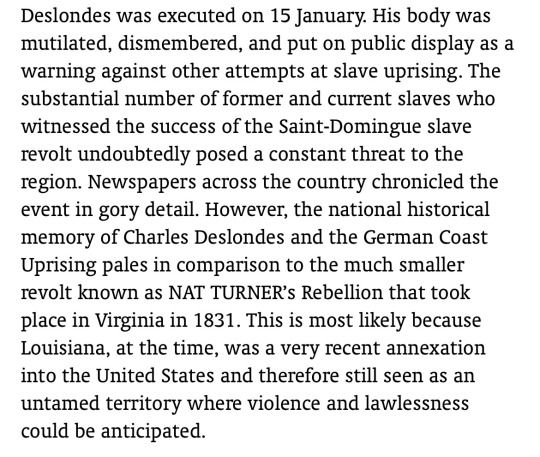

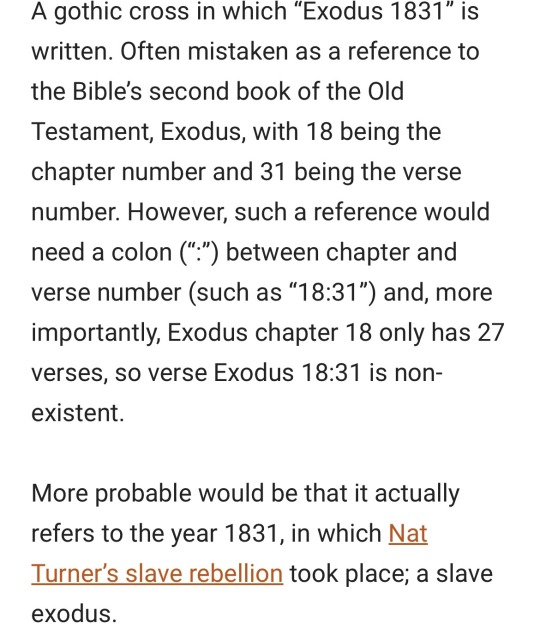
#this week#2019#German coast#uprising#slave rebellion#reenactment#thanks#Nola news#I found that stick#&made the fake baby#most people#had real props#lol
27 notes
·
View notes
Text
The 1791 Haitian Revolution of Black Slaves
Check out the newest LOST IN HISTORY blog post!
Haitian Black Slaves revolt against French control in 1791 The Haitian Revolution was the largest, most successful slave rebellion in the Western World. Black slaves initiated a rebellion in 1791 and by 1803, they’d ended not just slavery, but achieved independence over French colonial rule. Ironically, it was influenced by the French Revolution of 1789. This had brought forth new concepts of…
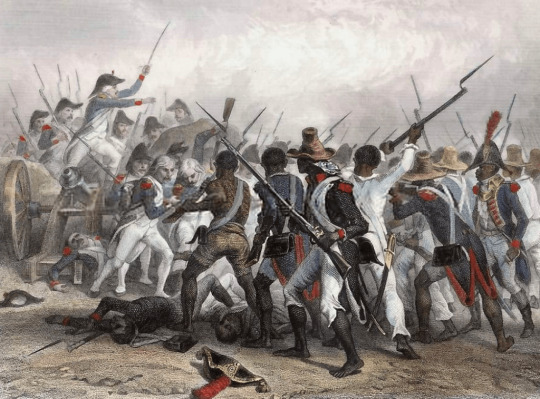
View On WordPress
3 notes
·
View notes
Text

Paul Bogle (1822–1865) was a Jamaican Baptist deacon, farmer, and activist, widely regarded as a national hero of Jamaica. He played a key role in the Morant Bay Rebellion of 1865, an uprising against social and economic injustices faced by the African-Jamaican population during British colonial rule.
Bogle lived in Stony Gut, St. Thomas Parish, and was deeply influenced by his Christian faith and the teachings of George William Gordon, a politician and fellow activist. Known for his leadership and courage, Bogle was an advocate for the rights of freedmen who were struggling under oppressive laws, lack of land ownership, and systemic discrimination.
In October 1865, after years of petitioning and peaceful protests had been ignored, Bogle led hundreds of disenfranchised citizens to the Morant Bay courthouse to demand justice. The protest turned violent when British troops fired on the crowd, and Bogle’s followers retaliated. The rebellion was eventually suppressed, with Bogle captured, tried, and hanged on October 24, 1865.
Though his rebellion was crushed, it brought attention to the plight of Jamaicans, leading to social and political reforms. Bogle is celebrated as a martyr and symbol of resistance, and his legacy lives on through his designation as a national hero of Jamaica in 1969. 🇯🇲
#black people#black history#blacktumblr#black#black tumblr#pan africanism#black conscious#africa#black power#black empowering#Paul Bogle#african diaspora#black diaspora#slave rebellion#colonial resistance#Morant Bay Rebellion#jamaica#Caribbean history
65 notes
·
View notes
Text

On this day in … 1743, Toussaint Louverture was born as a slave in the French colony of Saint-Domingue, now known as Haiti. He was a Haitian general and the most prominent leader of the Haitian Revolution. It was the only known slave uprising in human history that led to the founding of a state which was both free from slavery (though not from forced labour) and ruled by non-whites and former captives.
digital drawing hand drawn by @pyrotoons
#drawings#drawing#sketches#portrait#history#sketch#sketchbook#digitalart#illustration#toussaint louverture#Haiti#Haitian revolution#slave rebellion#anti slavery#revolutionary#Revolution#drawing sketch#digital drawing
5 notes
·
View notes
Text

5 notes
·
View notes
Text
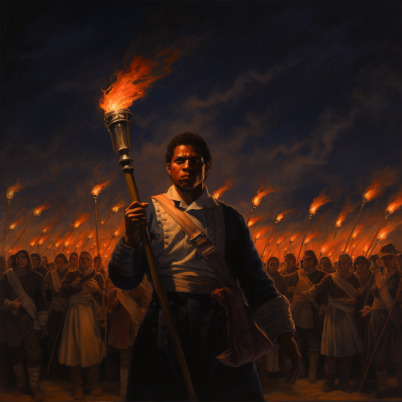
Gabriel Prosser: Igniting Freedom and Defiance Against Slavery
#black power#black excellence#slave rebellion#richmond#richmond virginia#Gabriel Prosser#tik tok#black tik tok
28 notes
·
View notes
Text
The Problems with Slavery:
0 notes
Text
1 note
·
View note
Text
Denmark Vesey (aka Telemaque), a Black American carpenter, is accused of planning a slave rebellion in Charleston, South Carolina. He would be tried & convicted, & 35 enslaved people would be executed by hanging. June 16, 1822.
Subscriber Content Add content here that will only be visible to your subscribers. Payment Image: Denmark Vesey (Public Domain) On this day in history, June 16, 1822, Denmark Vesey (aka Telemaque), a Black American carpenter, is accused of planning a slave rebellion in Charleston, South Carolina, involving thousands of enslaved Black people and the subsequent murder of antebellum slave…

View On WordPress
1 note
·
View note
Text

William Styron: The Confessions of Nat Turner (1967)
#william styron#nat turner#american history#enslaved#slave rebellion#time 100#pulitzer prize#us history#virginia#southampton
1 note
·
View note